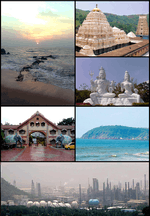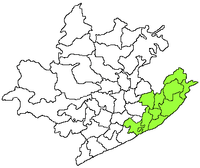Visakhapatnam
Visakhapatnam (also known as Vizag, Viśākha or Wāltair)[3] is the executive capital and the largest city of the Indian state of Andhra Pradesh.[4] It lies between the Eastern Ghats and the coast of the Bay of Bengal.[5][6] It is the third largest city in the east coast of India after Chennai and Kolkata and the fourth largest city in South India. It is one of the four smart cities of Andhra Pradesh selected under Smart Cities Mission.[7] Serving as the headquarters of its eponymous district, it is the most populous city in the state.[8][9][10] With an estimated output of $43.5billion, the city is the ninth largest contributor to India's overall gross domestic product as of 2016.[11][12] Vishakhapatnam serves as the headquarters for the Eastern Naval Command.[13]
Visakhapatnam Vizag, Vizagapatam, Waltair, Visakha | |
|---|---|
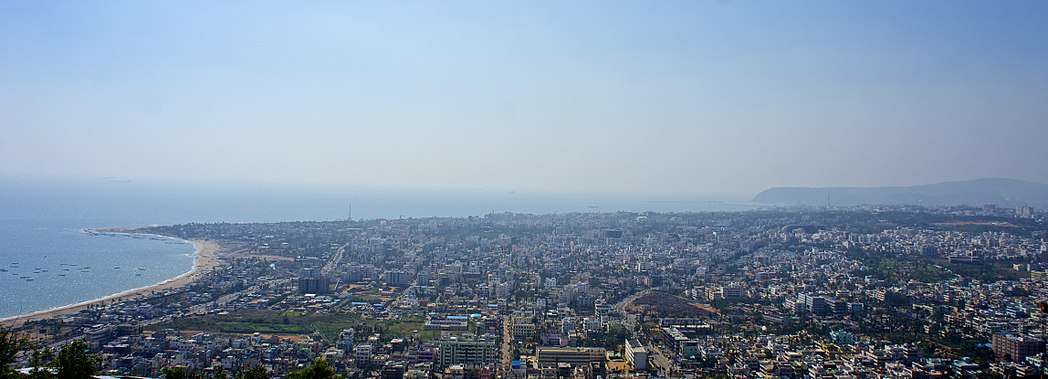 .jpg)  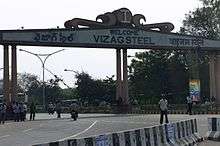 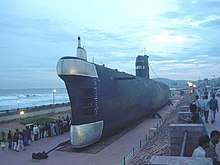 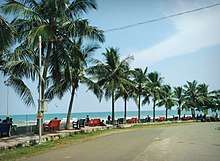  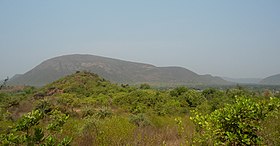 Top to bottom, left to right: Skyline of Visakhapatnam, Maha Stupa at Thotlakonda, Simhachalam Temple, Steel Plant, INS Kursura (S20) Museum at RK Beach, Bheemili Beach Road, Telugu Samskruthika Niketanam, Kambalakonda Wildlife Sanctuary. | |
| Nickname(s): The City of Destiny, The Jewel of the East Coast | |
.svg.png) Visakhapatnam  Visakhapatnam | |
| Coordinates: 17°42′15″N 83°17′52″E | |
| Country | India |
| State | Andhra Pradesh |
| District | Visakhapatnam |
| Incorporated (town) | 1865 |
| Incorporated (city) | 1979 |
| Government | |
| • Type | Municipal Corporation |
| • Body | GVMC, VMRDA |
| • Mayor | Vacant |
| Area | |
| • Metropolis | 681.96 km2 (263.31 sq mi) |
| • Metro | 4,873 km2 (1,881 sq mi) |
| Population (2011)[1] | |
| • Metropolis | 1,728,128 |
| • Rank | 17th |
| • Density | 2,500/km2 (6,600/sq mi) |
| • Metro | 5,018,000 |
| Demonym(s) | Vizagite ,Waltairodu |
| Time zone | UTC+5:30 (IST) |
| PIN | 530 0XX, 531 1XX |
| Telephone code | +91-891 |
| Vehicle registration | AP-31, AP-32, AP-33, AP-34 , AP-39 |
| Official languages | Telugu |
| Website | www |
Visakhapatnam's history stretches back to the 6th century BCE, when it was considered a part of the Kalinga Kingdom, and later ruled by the Vengi, the Pallava and Eastern Ganga dynasties.[14] Archaeological records suggest that the present city was built around the 11th and 12th centuries with control over the city fluctuating between the Chola Dynasty and the Gajapati Kingdom,[15][16] until its conquest by the Vijayanagara Empire in the 15th century.[14] Conquered by the Mughals in the 16th century, European powers eventually set up trading interests in the city, and by the end of the 18th century it had come under French rule.[15][16] Control passed to the British Raj in 1804 and it remained under British colonial rule until India's independence in 1947.
The city is home to the oldest shipyard and the only natural harbour on the east coast of India.[17] Visakhapatnam Port is the fifth-busiest cargo port in India, and the city is home to the headquarters of the Indian Navy's Eastern Command and South Coast Railway zone. Visakhapatnam is a major tourist destination and is particularly known for its beaches.[18] It has been nicknamed the "City of Destiny" and the "Jewel of the East Coast".[9] It has been selected as one of the Indian cities to be developed as a smart city under the Smart Cities Mission. As per the Swachhta Sarvekshan rankings of 2017, it was the third cleanest city in India in 2017.[19] It fell to 7th position in 2018[20] and to 23rd position in 2019.[21]
Etymology
The local belief behind the name of the city states, there was a king of 4th century, who on his pilgrimage halted at Lawson's Bay and built a temple dedicated to Vaisakha, which was submerged under the sea, but the name of the temple was got to the settlement. Other such names are, Kulotungapatnam, named by the Chola King Kulotuna I; Ishakapatnam, based on a Muslim Saint, Syed Ali Madani (Ishak Madani).[22][23] During the East India Company rule in India, the city was known with the name, Vizagapatam.[24] The suburb Waltair is another such name which was derived from the British colonial name.[9] "Vizagapatam" could also be spelled Visakhapatnam in the West European alphabet. Its shortened form, Vizag was used by the British administrators who were unable to pronounce its long name.[25] It is still referred to as Vizag by locals too, however since independence, people have reverted to calling it by its Indian name of Visakhapatnam.[22]
History
Visakhapatnam's history stretches back to the 6th century B.C.E. and the city finds mention in ancient texts such as the 4th century B.C.E. writings of Pāṇini and Katyayana. Historically considered part of the Kalinga region,[15][16] it was ruled by the Vengi kingdom and the Pallava and Eastern Ganga dynasties during medieval times.[14] Archaeological records suggest that the present city was built around the 11th and 12th centuries C.E. by the Chola Dynasty king Kulothunga I. Control over the city fluctuated between the Chola Dynasty of Tamil Nadu and the Gajapati Kingdom of Odisha[15][16] until its conquest by the Vijayanagara Empire in the 15th century.[14] In the 16th century it was conquered by the Mughals. European powers eventually set up trading interests in the city and Visakhapatnam came under French rule at the end of the 18th century.[15][16]
The city was ruled by Andhra Kings of Vengi and Pallavas. The city is named after Sri Vishaka Varma. Legend has it that Radha and Viśakha were born on the same day and were equally beautiful. Sri Vishaka Sakhi is the second most important gopi of the eight main gopis. She carries messages between Radha and Krishna and is the most expert gopi messenger. Local residents believe that an Andhra king built a temple to pay homage to his family deity Viśakha. This is now inundated under sea water near R K Beach. Another theory is that it is named after a woman disciple of Buddha named Viśakha. Later it was ruled by Qutb Shahis, Mughal Empire (between 1689 and 1724), Nizam (1724–1757) and France (1757–1765) before being captured by the British in 1765. European powers eventually set up trading interests in the city and Visakhapatnam came under French rule at the end of the 18th century.[15][16]
The British captured Visakhapatnam after the 1804 Battle of Vizagapatam and it remained under British colonial rule until India's independence in 1947 which was a part of the Northern Circars.
Buddhist influence
Hindu texts state that during the fifth century BC, the Visakhapatnam region was part of Kalinga territory, which extended to the Godavari River. Relics found in the area also prove the existence of a Buddhist empire in the region. Kalinga later lost the territory to King Ashoka in the bloodiest battle of its time, which prompted Ashoka to embrace Buddhism. Visakhapatnam is surrounded by ancient Buddhist sites, most of which have been excavated recently and illustrate the legacy of Buddhism in the region.
Pavurallakonda
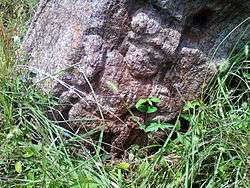
Pavurallakonda ("pigeon hill") is a hillock west of Bhimli, about 24 km (15 mi) from Visakhapatnam. The Buddhist settlement found here is estimated to date back from the first century BC to the second century AD. On the hillock (which overlooks the coastline) are 16 rock-cut cisterns for collecting rainwater. Gopalapatnam, on the Tandava River, is a village surrounded by brick stupas, viharas, pottery and other Buddhist artefacts.[26]
Sankaram
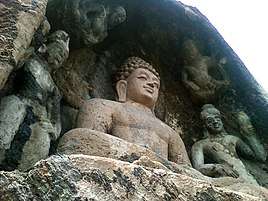
In 1907 British archaeologist Alexander Rea unearthed Sankaram, a 2,000-year-old Buddhist site. The name "Śankaram" derives from the Sangharama (temple or monastery). Located 40 km (25 mi) south of Visakhapatnam, it is known locally as Bojjannakonda and is a significant Buddhist site in Andhra Pradesh. The three major schools of Buddhism (Hinayana, Mahayana and Vajrayana) flourished here. The complex is known for its monolithic stupas, rock-cut caves and brick structures. The primary stupa was initially carved out of rock and covered with bricks. Excavations yielded historic pottery and Satavahana coins from the first century AD. At Lingalakonda, there are also rock-cut monolithic stupas in rows spread over the hill. The vihara was active for about 1,000 years.
Nearby is another Buddhist site, Bojjannakonda, with a number of images of the Buddha carved on the rock face of the caves. At Ligalametta there are hundreds of rock-cut monolithic stupas in rows, spread across the hill. Among other Buddhist attractions are a relic casket, three chaitya halls, votive platforms, stupas and Vajrayana sculptures.
Bavikonda
Bavikonda is an important Buddhist heritage site located on a hill about 15 km, northeast from Visakhapatnam city. Here the Buddhist habitation is noticed on a 16 ha flat terraced area. The Hinayana school of Buddhism was practised at the monastery between the 3rd century B.C. and the 3rd century A.D. Bavikonda has remains of an entire Buddhist complex, comprising 26 structures belonging to three phases. A piece of bone stored in an urn recovered here is believed to belong to the mortal remains of the Buddha. The word Bavikonda in Telugu means "a hill of wells". Fitting its name, Bavikonda is a hill with wells for the collection of rainwater. It is located 15 km (9.3 mi) from Visakhapatnam and is a significant Buddhist site. Excavation carried out from 1982 to 1987 revealed a Buddhist establishment including a mahachaitya embedded with relic caskets, a large vihara complex, numerous votive stupas, a stone-pillared congregation and rectangular halls and a refectory. Artifacts recovered from the site include Roman and Satavahana coins and pottery dating from the third century BC to the second century AD. A significant finding was a piece of bone (with a large quantity of ash) in an urn, which is believed to be the remains of the Buddha. The Bavikonda site is considered one of the oldest Buddhist sites in Asia. It is a reminder of the Buddhist civilisation which once existed in southern India, and also reminiscent of Borobudur in Indonesia.[27]
Thotlakonda
.jpg)
About 16 km (9.9 mi) from Visakhapatnam is Thotlakonda, a Buddhist complex situated on top of a hill. The Buddhist complex on the Mangamaripeta hilltop, locally known as Totlakonda, lies about 16 km from Visakhapatnam on Visakhapatnam-Bheemili Beach Road. After its discovery (during an aerial survey), the Government of Andhra Pradesh declared the 48 ha site as a protected monument in 1978. Excavations in 1988 to 1992 exposed structural remains and artefacts, classified as Religious, Secular and Civil. These structures include the Stupa, Chaityagrihas, pillared congregation halls, bhandagaras, refectory (bhojanasala), drainage and stone pathways. The site covers an area of 120 acres (49 hectares), and has been declared a protected area by the government of Andhra Pradesh. Excavations have revealed three kinds of structural remains: religious, secular and civil. Structures include a mahastupa, sixteen votive stupas, a stone-pillared congregation hall, eleven rock-cut cisterns, well-paved stone pathways, an apsidal chaitya-griha, three round chaitgya-grihas, two votive platforms, ten viharas and a kitchen complex with three halls and a refectory (dining hall). Apart from the structures, Buddhist treasures excavated include nine Satavahana and five Roman silver coins, terracotta tiles, stucco decorative pieces, sculptured panels, miniature stupa models in stone, Buddha padas depicted with ashtamangala symbols (i.e. the eight auspicious symbols of Swastika, Shrivasta, Nandhyavarta, Vardhamanaka, Bhadrasana, Kalasha, Minyugala and Darpan) and early pottery.[28]
Later history
The territory of Visakhapatnam then came under the Andhra rulers of Vengi, and Chalukyas and Pallavas ruled the land. The region was ruled by the Eastern Ganga king- SuryaVamsa Kshatriyas and the Gajapati kings of Odisha from the 10th century to the 16th centuries AD (when the region came under the Visakhapatnam rulers). Based on archaeological evidence, the Prabhakar and the Eastern Ganga Kings of Odisha built temples in the city in the 11th and 12th centuries. The Mughals ruled the area under the Visakhapatnam Nizam during the late 15th and early 16th centuries. European merchants from France, Holland and the East India Company used the natural port to export tobacco, paddy, coal, iron ore, ivory, muslin and other textile products.
Local legend tells that an Andhra king, on his way to Benares, rested at Visakhapatnam and was so enchanted by its beauty that he ordered a temple to be built in honour of his family deity, Viśakha. Archaeological sources, however, reveal that the temple was probably built between the 11th and 12th centuries by the Cholas. A shipping merchant, Shankarayya Chetty, built one of the mandapams (pillared halls) of the temple. Although it no longer exists (possibly washed away about 100 years ago by a cyclonic storm), elderly residents of Visakhapatnam remember visits to the ancient shrine by their grandparents (although author Ganapatiraju Atchuta Rama Raju denies this).[29]
During the 18th century Visakhapatnam was part of the Northern Circars, a region comprising coastal Andhra and southern coastal Odisha which was first under French control and later British. Visakhapatnam became a district in the Madras Presidency of British India. In September 1804, British and French squadrons fought the naval Battle of Vizagapatam near the harbour. After India's independence it was the largest district in the country and was subsequently divided into the districts of Srikakulam, Vizianagaram and Visakhapatnam.
Part of the city is known by its colonial British name, Waltair; during the colonial era, the city's hub was the Waltair railway station and a part of the city is still called Waltair.
- International Fleet Review 2016
On 7 May 2020, the city suffered an industrial accident when a polymer plant leaked toxic styrene gas, as it restarted operations after the Coronavirus lockdown. This gas leak killed at least eleven people, and drew comparisons to the Bhopal disaster.[30]
Geography

The city is situated between the Eastern Ghats and the Bay of Bengal.[5] The city coordinates lies between 17.7041 N and 83.2977 E.[31][32]
Climate
Visakhapatnam has a tropical wet and dry climate (Köppen Aw).[32] The annual mean temperatures ranges between 24.7–30.6 °C (76–87 °F), with the maximum in the month of May and the minimum in January; the minimum temperatures ranges between 20–27 °C (68–81 °F). The highest maximum temperature ever recorded was 42.0 °C (107.6 °F) in 1978, and the lowest was 20.0 °C (68 °F) in 1904. It receives rainfall from the South-west and North-east monsoons[32] and the average annual rainfall recorded is 1,118.8 mm (44.05 in).[33]
| Climate data for Visakhapatnam Airport (1981–2010, extremes 1901–2010) | |||||||||||||
|---|---|---|---|---|---|---|---|---|---|---|---|---|---|
| Month | Jan | Feb | Mar | Apr | May | Jun | Jul | Aug | Sep | Oct | Nov | Dec | Year |
| Record high °C (°F) | 34.8 (94.6) |
38.4 (101.1) |
40.0 (104.0) |
40.5 (104.9) |
45.0 (113.0) |
45.4 (113.7) |
41.4 (106.5) |
38.8 (101.8) |
38.2 (100.8) |
37.2 (99.0) |
35.0 (95.0) |
34.0 (93.2) |
45.4 (113.7) |
| Average high °C (°F) | 29.5 (85.1) |
31.6 (88.9) |
34.2 (93.6) |
35.4 (95.7) |
36.3 (97.3) |
35.4 (95.7) |
33.4 (92.1) |
33.0 (91.4) |
33.0 (91.4) |
32.3 (90.1) |
30.9 (87.6) |
29.5 (85.1) |
32.9 (91.2) |
| Daily mean °C (°F) | 23.8 (74.8) |
25.9 (78.6) |
28.8 (83.8) |
30.7 (87.3) |
31.9 (89.4) |
31.5 (88.7) |
29.8 (85.6) |
29.6 (85.3) |
29.4 (84.9) |
28.5 (83.3) |
26.3 (79.3) |
23.9 (75.0) |
28.3 (82.9) |
| Average low °C (°F) | 18.4 (65.1) |
20.5 (68.9) |
23.7 (74.7) |
26.3 (79.3) |
27.8 (82.0) |
27.8 (82.0) |
26.7 (80.1) |
26.3 (79.3) |
26.1 (79.0) |
24.9 (76.8) |
22.0 (71.6) |
18.8 (65.8) |
24.1 (75.4) |
| Record low °C (°F) | 10.5 (50.9) |
12.8 (55.0) |
14.4 (57.9) |
18.3 (64.9) |
20.0 (68.0) |
21.1 (70.0) |
21.3 (70.3) |
21.1 (70.0) |
17.5 (63.5) |
17.6 (63.7) |
12.9 (55.2) |
11.3 (52.3) |
10.5 (50.9) |
| Average rainfall mm (inches) | 10.5 (0.41) |
12.1 (0.48) |
11.4 (0.45) |
21.8 (0.86) |
63.0 (2.48) |
117.6 (4.63) |
130.4 (5.13) |
157.8 (6.21) |
202.1 (7.96) |
209.3 (8.24) |
87.9 (3.46) |
7.9 (0.31) |
1,031.7 (40.62) |
| Average rainy days | 0.9 | 0.9 | 0.6 | 1.5 | 3.4 | 6.4 | 8.8 | 8.4 | 9.8 | 8.1 | 3.4 | 0.9 | 53.0 |
| Average relative humidity (%) (at 17:30 IST) | 63 | 62 | 63 | 67 | 68 | 67 | 71 | 73 | 76 | 73 | 66 | 63 | 68 |
| Mean monthly sunshine hours | 272.8 | 271.2 | 272.8 | 264.0 | 251.1 | 135.0 | 130.2 | 133.3 | 168.0 | 229.4 | 228.0 | 269.7 | 2,625.5 |
| Mean daily sunshine hours | 8.8 | 9.6 | 8.8 | 8.8 | 8.1 | 4.5 | 4.2 | 4.3 | 5.6 | 7.4 | 7.6 | 8.7 | 7.2 |
| Source 1: India Meteorological Department (sun 1971–2000)[34][35][36] | |||||||||||||
| Source 2: Tokyo Climate Center (mean temperatures 1981–2010)[37] | |||||||||||||
| Climate data for Visakhapatnam (Dolphin's Nose) 1981–2010, extremes 1970–2005) | |||||||||||||
|---|---|---|---|---|---|---|---|---|---|---|---|---|---|
| Month | Jan | Feb | Mar | Apr | May | Jun | Jul | Aug | Sep | Oct | Nov | Dec | Year |
| Record high °C (°F) | 30.7 (87.3) |
35.0 (95.0) |
36.2 (97.2) |
36.1 (97.0) |
42.8 (109.0) |
39.8 (103.6) |
39.8 (103.6) |
36.2 (97.2) |
36.6 (97.9) |
34.5 (94.1) |
32.4 (90.3) |
31.4 (88.5) |
42.8 (109.0) |
| Average high °C (°F) | 27.2 (81.0) |
26.9 (80.4) |
30.6 (87.1) |
31.5 (88.7) |
32.6 (90.7) |
32.2 (90.0) |
30.6 (87.1) |
30.5 (86.9) |
30.6 (87.1) |
30.2 (86.4) |
28.8 (83.8) |
27.4 (81.3) |
30.1 (86.2) |
| Average low °C (°F) | 19.8 (67.6) |
21.4 (70.5) |
23.5 (74.3) |
25.0 (77.0) |
26.1 (79.0) |
26.0 (78.8) |
25.0 (77.0) |
24.8 (76.6) |
24.8 (76.6) |
23.8 (74.8) |
21.8 (71.2) |
19.8 (67.6) |
23.5 (74.3) |
| Record low °C (°F) | 15.6 (60.1) |
17.7 (63.9) |
17.4 (63.3) |
17.9 (64.2) |
18.5 (65.3) |
18.4 (65.1) |
18.4 (65.1) |
19.6 (67.3) |
18.8 (65.8) |
19.4 (66.9) |
16.3 (61.3) |
14.1 (57.4) |
14.1 (57.4) |
| Average rainfall mm (inches) | 14.3 (0.56) |
28.9 (1.14) |
14.6 (0.57) |
25.0 (0.98) |
66.0 (2.60) |
107.5 (4.23) |
131.8 (5.19) |
132.6 (5.22) |
161.6 (6.36) |
270.4 (10.65) |
105.1 (4.14) |
3.5 (0.14) |
1,061.2 (41.78) |
| Average rainy days | 1.0 | 1.1 | 0.4 | 1.4 | 3.4 | 5.4 | 7.8 | 7.4 | 8.5 | 8.3 | 4.0 | 0.7 | 49.3 |
| Average relative humidity (%) (at 8:30 IST) | 78 | 76 | 75 | 78 | 77 | 79 | 83 | 83 | 82 | 79 | 73 | 72 | 76 |
| Source: India Meteorological Department[34][35] | |||||||||||||
In October 2014 Cyclone Hudhud made landfall near Visakhapatnam.[38]
Demographics
As of 2011 census of India, Visakhapatnam had a population of 1,728,128, of which males were 873,599 and females were 854,529, – a sex ratio of 978 females per 1000 males. The population density was 18,480/km2 (47,900/sq mi). There were 164,129 children in the age group of 0–6 years, with 84,298 boys and 79,831 girls, – a sex ratio was 947 girls per 1000 boys. The average literacy rate stood at 81.79% with a total of 1,279,137 literates, of which 688,678 were males and 590,459 were fermales.[39][40] Visakhapatnam is ranked 122 in the list of fastest-growing cities in the world.[41] The total slum population covers 44.61% of the total population which implies 770,971 people reside in slums.[42]
The population crossed two million mark after expansion of the city limits and stands at 2,035,922.[43]
Language and religion
Languages in Visakhapatnam (2011)
Source: Languages in Visakhapatnam - Census 2011 data
Telugu is the most predominantly spoken language by the native speakers. Hindi is also spoken widely in this city by localities also.[44][45] Two dialects of Telugu are spoken by the people, the common dialect and the Uttarandhra (North Eastern Andhra) dialect. The latter is mainly spoken by the people who originally belong to the districts of Vizianagaram and Srikakulam.[46] A cosmopolitan population of Visakhapatnam comprise Tamils,[47][48] Malayalis,[49][50] Sindhis[51] and Kannadigas,[52][53] and also Odias,[54] Bengalis and Bihari migrants from other regions of India.[55][56] There is also an Anglo-Indian community, regarded as the first cosmopolitans of the city.[57]
According to 2011 census, Telugu is the most spoken language in the city, with 90.72% speakers, followed by Urdu (2.52%), Hindi (4.15%), Odia (2.00%), Tamil (0.33%), Malayalam (0.32%), and Bengali (0.31%).[58]
Hinduism is practised by the majority of its citizens, followed by Islam and Christianity. The area practised Buddhism for two millennia, as evidenced by the many Buddhist sangharamas in the outlying areas but the population of Buddhists has waned, with approximately 0.03% population in the entire city based on the recent census.[59]
Government and politics
Civic administration
Greater Visakhapatnam Municipal Corporation (GVMC) is the civic body that oversees the civic needs of the city.[60] It is one of the oldest municipalities in the state, established in 1858 as a Voluntary Municipal Association and upgraded to corporation in 1979, before getting Greater tag on 20 November 2005.[61] It has a jurisdictional area of 681.96 km2 (263.31 sq mi),[62] which includes the merged municipalities of Gajuwaka, Anakapalle and Bheemunipatnam.[43][63] The present municipal commissioner of the city is M.Hari Narayanan.[64] Law and order in the city is dealt by Visakhapatnam City Police, equipped with a Police Commissionerate with Commissioner of Police as the head and with assisted by three deputy commissioners for different zones.[65] Visakhapatnam Metropolitan Region Development Authority (VMRDA) is an urban planning agency that covers the GVMC and its suburbs covering, two corporations, one municipality, one nagar panchayat and 895 villages from two districts of Viskhapatnam and Vizianagaram.[66][63] The expanded area of the city, Visakhapatnam Metropolitan Region extends to 4,873 km2 (1,881 sq mi) with a population of 50,18,000 (Western: 59,18,000) and is under the administration of Visakhapatnam Metropolitan Region Development Authority.[67][68][2]
Economy

Visakhapatnam is one of the 100 fastest growing cities in the world,[69] which has a GDP of $43.5 billion. It is the 9th richest city in India.[70] The usual seafood exporting capacity of the harbour is 115,000 tonnes (127,000 short tons)[71] and during the FY 2015, it topped seafood exports in terms of value among other ports.[72] Visakhapatnam Port and Gangavaram Port are the two ports of the city and the former one topped charts which handled 60,000,000 tonnes (66,000,000 short tons) of cargo during the financial year 2016–17.[73] The Hindustan Shipyard undertakes building and repairing of Naval fleet and has future orders of ₹20 billion (US$280 million).[74]
Information technology The growth in the IT sector in the recent times boosting the local economy.[75] In 2016–17, the IT industry in Vizag witnessed an increase in its turnover which recorded as ₹54 billion (US$760 million) with more than 350 firms,[76] in contrast to 2013–14 figures of ₹14.5 billion (US$200 million).[77] Sunrise Startup Village, an incubation centre;[78] Fintech Valley Vizag were established to promote visakhapatnam as Global Financial-Tech (Fintech) Capital in the Andhra Pradesh state.[79][80] Millennium IT Towers 1 is inaugurated by the Chief Minister of Andhra Pradesh Nara Chandrababu Naidu on 15 Feb 2019 and Millennium IT Towers 2 is in pipeline to promote fintech investments in the city.[81]
There are many national and multi–national IT/ITes and fintech firms such as IBM, Wipro, Tech Mahindra, Kenexa, Infotech, Conduent, Cyient, Paytm, Concentrix, Sutherland, HSBC, etc. Some more investments are in line, like Google x, Lalith Ahuja's ANSR Consulting, Franklin Templeton, Innova Solutions, etc. at Fintech Valley in the city.[82][83] The Brandix India Apparel City is the largest textile park in the country and holds the record for employing more than 15,000 women employees at a single location.[84]
Pharma Industries: The Jawaharlal Nehru Pharma City (JNPC) developed at Parawada near Visakhapatnam in 2,400 acres has major pharma companies like, Hospira, Mylan, Eisai, Reddy's Lab, Aurobindo Pharma, Torrent pharma, Divis Lab, etc.[85][86][87] Andhra Pradesh Medtech Zone Limited, is the India's first Ultra Modern Medical Equipment Manufacturing & Testing Facility, open to Manufacturers & Innovators.[88]
The prevalence of ferroalloy plants is due to the availability of manganese ore near Visakhapatnam. Aluminium refineries such as Anrak Aluminium and Jindal Aluminium are developing because of the bauxite reserves around the city.[89] Visakhapatnam is a part of the Petroleum, Chemical and Petrochemical Investment Region (PCPIR), proposed between Visakhapatnam and Kakinada. The PCPIR is expected to generate 1.2 million jobs and require a projected investment of ₹400 billion (US$5.6 billion).[90] Simhadri Super Thermal Power Plant of NTPC Limited is expanding from 1,000 to 2,000 MW at a cost of ₹50 billion (US$701 million). Hindujas has begun construction of a 1,070 MW thermal power plant in Visakhapatnam district at a cost of ₹70 billion (US$981 million).[91] NTPC is establishing 4×1,000 MW imported coal-based thermal power plant in Visakhapatnam district in Andhra Pradesh, which will come up at an investment of ₹200 billion (US$2.8 billion). Approximately ₹50 million (US$700,000) outlay is needed for generation of one megawatt thermal power.[92]
Cityscape
.jpg)
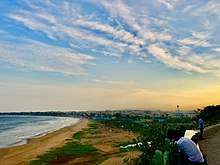
Neighbourhoods
Over the years, Visakhapatnam has turned from a fishing village into a commercial city with busy streets. Most notable areas of the city include urban areas like Allipuram, Arilova, Asilmetta, Dwaraka Nagar, Gajuwaka, Gopalapatnam, Jagadamba Centre, Lawsons Bay Colony, Maddilapalem, Madhurawada, MVP Colony, Rushikonda, Seethammadhara, Siripuram and semi-rural suburbs such as Anakapalle, Bheemunipatnam, Duvvada, Parawada, Pendurthi and Thagarapuvalasa .
Landmarks
Visakhapatnam is one of the main tourism destinations in the state of Andhra Pradesh. The city is famous for beaches, caves and the Eastern Ghats as well as wildlife sanctuaries. About 30% of the city is covered with greenery.[94]
Major landmarks in the city include Dolphin's Nose, lighthouse, Kailasagiri, Beach Road, VMRDA Park, Visakha Museum and Matsyadarsini (an aquarium). The INS Kursura Submarine Museum and Anti-submarine warfare (ASW) aircraftTU 142 Aircraft Museum opposite to each other is the only of its kind in the world, conceptualizing the hunted and hunter of the wars.[95][96] Indira Gandhi Zoological Park in the city has variety of wildlife species. Erra Matti Dibbalu (Red sand dunes) are situated between Visakhapatnam and Bheemunipatnam are one of the geo-heritage sites in the country. This tourist spot is now protected and preserved as a heritage site.[97] Dr Ramanaidu Film Studio in 33 acres space off the Visakha-Bhimili beach road is one of the film shootings destination. Telugu Samskruthika Niketanam on atop Kailasagiri was developed by World Telugu Federation and Visakhapatnam Urban Development Authority,[98] Vuda City Central Park .[99] Adding one more feather to its cap, Visakhapatnam is home to India's tallest musical fountain opened in the central park. Oscillating vertically at 360 degrees, the fountain dances to the tune of digital music in different colors.[100]
Beaches along the coastline of the Bay of Bengal include RK Beach, Rushikonda Beach and Mangamaripeta Beach. Others are Yarada, Bheemili, Lawson's Bay, Tenneti, Sagar Nagar, Thotlakonda and Gangavaram beaches.[101] Borra Caves are caves discovered by British geologist William King in 1807.[102] Tyda (an Eco tourism project), Kambalakonda Wildlife Sanctuary under Andhra Pradesh Forest Department are wildlife conservation sites near the city.[96]
Culture
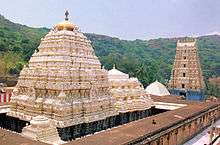
Poets, artists Some of the notable poets from the city include Sri Sri, Gollapudi Maruti Rao, Sirivennela Seetharama Sastry.
Religious worships
Some of the religious sites are also of great importance like Simhachalam temple of Lord Narasimha 16 km (9.9 mi) north of the city,[103][104] and Sri Kanaka Maha Lakshmi Temple. Recent archaeological excavations of Buddhist shrines revealed Buddhist dominance in this area and these are recognised as heritage sites that include Boudharamam, Saligudam, Sankaram and Devipuram etc.
Transport
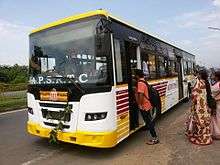
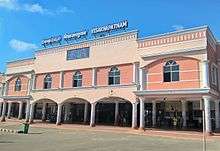
The city commuters prefer city buses and auto rickshaws as the primary mode of transport, followed by two-wheelers and cars.[105] Road and rail are preferred for long-distance commuting and are supported by Dwaraka bus station and Visakhapatnam railway station respectively.[106][107] It also has sea and air travel infrastructure such as, Visakhapatnam Port[108] and Visakhapatnam Airport.[109]
The APSRTC Visakhapatnam Region operates city, district and inter-state bus services from Dwaraka bus station.[110] Over 600 city buses operate over 150 routes, in addition to Bus Rapid Transit System in two corridors of Pendurthi and Simhachalam.[105]:21 A planned Integrated Bus Terminal Complex would be built at Maddilapalem.[111] Apart from buses, there are about 25,000 auto rickshaws plying on the city roads which provide intermediate public transport.[105]:22
Visakhapatnam is the headquarters of South Coast Railway zone of Indian railways. Visakhapatnam railway station is as an A1 station[112] with the highest gross revenue in the Waltair railway division.[113] It serves an average of 20,000–25,000 passengers daily and may rise up to 40,000 during festivals.[107] It has the country's largest diesel locomotive shed with a capacity of 206.[114] Visakhapatnam Metro is a planned metro rail project.[115]
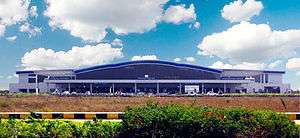
As of 2013, the percentage of transport mode shares in the city are, 18% buses, 9% autos, 15% two wheelers, 2% cars and 55% non-motorised transport (bicycles and pedestrians).[105]:23 The total road network accounts for a total length of 2,007.10 km (1,247.15 mi).[116] NH16, a major highway and a part of the Golden Quadrilateral system bypasses the city. During the 2016-17 fiscal year.
Visakhapatnam Airport (IATA: VTZ, ICAO: VOTZ) had served a total of 2,358,029 passengers, an increase of 30.7% from previous year.[117] It handled 19,550 aircraft including 1,421 international and 18,129 domestic.[118]
Visakhapatnam Port is one of 13 major ports in India and the only major port of Andhra Pradesh. It is India's second-largest port by volume of cargo handled. It is located on the east coast of India and is located midway between the Chennai and Kolkata Ports. Cruise shipping is operational between Visakhapatnam and Andaman and Nicobar islands. [119]
Education
_established_in_1847_in_Visakhapatnam%2C_Andhra_Pradesh.jpg)
The primary and secondary school education is imparted by government, aided and private schools, under the School Education Department of the state.[120][121] As per the school information report for the academic year 2016–17, urban Visakhapatnam had 1,44,268 (Western: 144,268) students[122] enrolled in 434 schools.[123] The Central Board of Secondary Education, Secondary School Certificate or the Indian Certificate of Secondary Education are the different types of syllabus followed by different schools. The medium of instruction followed by schools are English and Telugu.[124] The St. Aloysius Anglo Indian Boys High School is the oldest school in the city to have established in the year 1847.[125] The Visakhapatnam District Central Library is supported by the government and is located at Dwaraka Nagar.[126][127]
There are tens of junior colleges under Government, Andhra Pradesh Social Welfare Residential and private undertakings.[128] Andhra University is the only autonomous college approved under Universities Grant Commission scheme.[129] Mrs. A. V. N. College is one of the oldest educational institution in the city.[102]:35
The GITAM University and the Gayatri Vidya Parishad College of Engineering are other technical-education institutions in the city. Visakhapatnam is also home to Damodaram Sanjivayya National Law University, which is the National Law University for the state of Andhra Pradesh. DSNLU takes entrance through Common Law Admission Test and ranks 15th by order of establishment among the 17 National Law Universities. Vizag is due to get India's First Packaging park[130] with an Indian Institute of Packaging, IIP[131] and BITS Pilani & Birla International School under the aegis of Sarala Birla Academy.[132]
The Indian Maritime University was established as a central university by the government of India by an act of Parliament (the Indian Maritime University Act 2008). IMU is poised to play a role in the development of human resources for the maritime sector. Visakhapatnam also has the National Institute of Oceanography. The Indian Institute of Management,[133] Indian Institute of Petroleum and Energy[134] are the other institutions of national importance.
Defence and research
Naval base
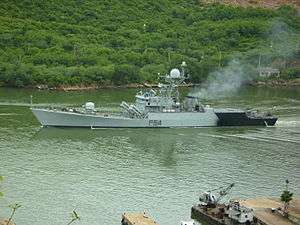
Visakhapatnam is the headquarters of the Eastern Naval Command, the Naval Science and Technological Laboratory (a DRDO Lab), a Chief Quality Assurance Establishment (CQAE), an EFS office, a Naval Dockyard (established in 1949) and Naval Bases including INS Virbahu, INS Karna, INS Kalinga, INS Samudrika, INS Satavahana, and INS Dega. A new base at INS Rambilli is being built on 5,000 acres (20 km2) with an investment of ₹15 billion (US$210 million), as the first dedicated submarine base in India. India's first nuclear submarine INS Arihant was launched in the Naval Dockyard, and Bharat Dynamics has begun manufacturing torpedoes. Visakhapatnam also has presence of the Indian Coast Guard including ships and offices. Multiple naval training establishments, such as the Navy ShipWright School,[135] are also situated here.
Research organisations
The Bhabha Atomic Research Centre (BARC) plans its second research facility in the country (after Trombay) in the area.[136] There are also offices of the National Institute of Oceanography and the India Meteorological Department.
Sports
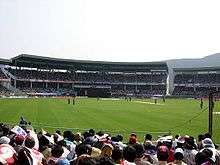
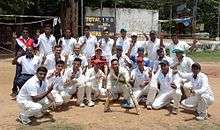
Cricket is the most popular sport, followed by tennis and football. Visakhapatnam is home to a number of local cricket teams participating in district and zonal matches. Gully cricket (a form of cricket played in streets or parks) is a popular sport among local youth. Visakhapatnam co-hosted the 32nd National Games alongside Hyderabad in 2002. The city has seven cricket stadiums, which are used for Ranji Trophy matches; two of these stadiums have been used for one day international matches. Indira Priyadarshini Stadium, also known as the Municipal Corporation Stadium, hosted the first ODI match on 9 December 1988 and the last ODI on 3 April 2001. The stadium has been discontinued in favour of the new ACA-VDCA Stadium in Madhurawada.
ACA-VDCA Stadium is the home of Andhra Cricket Association. It regularly hosts Ranji Trophy, One Day Internationals and Test Internationals. The stadium is the home ground of Andhra Pradesh cricket team. The stadium also hosted IPL matches as a neutral venue. It hosted its first test match against England beginning on 17 November 2016.
Port Trust Golden Jubilee Stadium is the second largest stadium in Visakhapatnam, which has hosted Under-19 Youth Internationals. It also hosted the 2014 Pro Kabaddi League season as the home ground for the Telugu Titans.[137]Swarna Bharathi Indoor Stadium, built by the Greater Visakhapatnam Municipal Corporation, is used for various indoor sports,[138] and the GVMC Aqua Sports Complex, an aquatic centre for swimming and diving, is near the beach road.[139]
Surfing activities are common at the Rushikonda beach.[140] Scuba diving at Chintapalli in the scenic city has been attracting tourists from all over.[141]
Media
The Telugu dailies publishers in the city are Eenadu, Andhra Jyothy, Sakshi, Andhra Bhoomi, Andhra Prabha, Vaartha, Suryaa, Prajasakti and Visalaandhra. Apart from the local language, there are also English papers such as, The Hindu, The Times of India, Deccan Chronicle, The Hindu Business Line, The New Indian Express and The Hans India. While Most of the Newspapers in Andhra and All Over India were printed and circulated from here only.
FM stations in Vizag
- Radio City – 91.1 – Telugu/Hindi
- Big 92.7 FM – 92.7 – Telugu/Hindi
- Red FM – 93.5 – Telugu/Hindi
- Radio Mirchi – 98.3 – Telugu
- AIR Primary – 101.6 – Telugu[142]
- AIR FM Rainbow – 102.0 – Telugu
- Visakha FM – 105.6 – Telugu
- Gyan Vani – 106.4 – Telugu/English/Hindi[143]
Notable people born or associated with the city
- Alluri Sitarama Raju
- M. V. V. S. Murthi
- Gurazada Apparao
- Concordia Merrel
- Sir C. V. Raman
- Gam Malludora
- Cattamanchi Ramalinga Reddy
- Sarvepalli Radhakrishnan
- Tenneti Viswanadham
- Srirangam Srinivasa Rao
- Aarudhra
- Gollapudi Maruti Rao
- Sirivennela Seetharama Sastry
- Venkaiah Naidu
- Ramana Gogula[144]
- Saketh Myneni
- P. T. Srinivasa Iyengar
- Kotcherlakota Rangadhama Rao
- Kambhampati Hari Babu
- Nookala Chinna Satyanarayana
- Sri Kantha Krishnamacharyulu
- Devika Rani
- LV Revanth
- Yalaka Venugopal Rao
See also
- List of most populous cities in India
- List of municipal corporations in India
- Pedamadaka
References
- "INDIA STATS : Million plus cities in India as per Census 2011". Press Information Bureau, Mumbai. National Informatics Centre (NIC). Retrieved 7 February 2012.
- "Key Facts on VMR" (PDF). Visakhapatnam Urban Development Authority. pp. 44–45. Archived from the original (PDF) on 5 March 2016. Retrieved 21 December 2015.
- "Behind The Name - Vizag". Vizag -. Retrieved 17 April 2020.
- "Decks cleared for three capitals in Andhra Pradesh as Governor gives nod to bills". The New Indian Express. Retrieved 31 July 2020.
- "In pics: Hudhud takes the green sheen off Vizag". Hindustan Times. 21 October 2014. Archived from the original on 17 August 2017. Retrieved 11 July 2017.
- "About District | Visakhapatnam District, Government of Andhra Pradesh | India". Retrieved 16 April 2020.
- 29 Dec. "AP: Andhra Pradesh smart cities to be ready by 2021 | Vijayawada News - Times of India". The Times of India. Retrieved 17 April 2020.
- Mukerji, Chandralekha (21 March 2016). "Real estate: Here are 9 smart Indian cities to invest in – The Economic Times". The Economic Times. Archived from the original on 23 May 2017. Retrieved 16 May 2017.
- Academy, Students'. Visakhapatnam-The City of Destiny-India. Lulu.com. p. 4. ISBN 978-1-257-06510-3. Retrieved 16 May 2017.
- "Metropolitan cities of India" (PDF). Central Pollution Control Board, Government of India. Archived from the original (PDF) on 17 May 2017. Retrieved 16 May 2017.
- "Visakhapatnam district development plan" (PDF).
- "Vizag 9th richest city in country".
- "Basic Organization". Join Indian Navy. Retrieved 28 May 2020.
- "Visakhapatnam District". Visakhapatnam District. Archived from the original on 7 May 2015. Retrieved 9 May 2015.
- "Maps of India – Visakhapatnam History". Maps of India. Archived from the original on 26 February 2010. Retrieved 9 May 2015.
- "History of Visakhapatnam". I Love India. Archived from the original on 18 May 2015. Retrieved 9 May 2015.
- Gopalakrishnan, Hema (7 November 2012). "A career in Vizag". The Hindu. Retrieved 18 May 2015.
- Ghosh, G. K. (2008). Bamboo: The Wonderful Grass. APH Publishing. p. 300. ISBN 9788131303696. Retrieved 21 July 2017.
- "Swachh Survekshan – 2017: Sanitation Rankings of Cities/Towns State/UT-wise". pib.nic.in. Archived from the original on 11 May 2017. Retrieved 4 May 2017.
- "Vizag falls four places in Swachh rankings, GVMC vows to do better - Times of India". The Times of India.
- "Vizag slips to 23rd position in Swachh Survekshan Survey". The Hindu. 7 March 2019.
- Hatangadi, Hatangadi (21 February 2016). "Vizag's hidden history". The Times of India. Archived from the original on 12 August 2017. Retrieved 16 May 2017.
- Raju, Rapaka Satya (1989). Urban Unorganised Sector in India. Mittal Publications. p. 69. Retrieved 16 May 2017.
- "First Sepoy Mutiny took place in Vizag". The Hindu. 4 October 2016. Archived from the original on 20 December 2016. Retrieved 16 May 2017.
- Kapil, Fathima Kutty (2 October 1989). District Administration and Social Change in India: A Study of Vizagapatnam District, 1794-1898 (2nd ed.). Stosius Inc - Advent Books Division. ISBN 978-8170271444.
- "Pavuralakonda". The Times of India. Retrieved 12 December 2012.
- "bavikonda". buddhist-tourism.com. Archived from the original on 22 December 2015. Retrieved 7 September 2015.
- "thotlakonda". The Hindu. 18 June 2015. Retrieved 18 June 2015.
- "Viśakha traces its name to Buddhist princess". The Hindu. 15 July 2002. Archived from the original on 13 September 2003. Retrieved 24 September 2009.
- Gettleman, Jeffrey; Raj, Suhasini; Schultz, Kai; Yasir, Sameer (7 May 2020). "Gas Leak in India at LG Factory Kills 11 and Sickens Hundreds". The New York Times. ISSN 0362-4331. Retrieved 7 May 2020.
- "Visakhapatnam Climatological Table Period: 1951–1980". India Meteorological Department. Archived from the original on 2 April 2015. Retrieved 25 March 2015.
- "Climatological Normals 1981–2010" (PDF). India Meteorological Department. January 2015. pp. 794–798. Archived from the original (PDF) on 5 February 2020. Retrieved 17 February 2020.
- "Extremes of Temperature & Rainfall for Indian Stations (Up to 2012)" (PDF). India Meteorological Department. December 2016. p. M20. Archived from the original (PDF) on 5 February 2020. Retrieved 17 February 2020.
- "Table 3 Monthly mean duration of Sun Shine (hours) at different locations in India" (PDF). Daily Normals of Global & Diffuse Radiation (1971–2000). India Meteorological Department. December 2016. p. M-3. Archived from the original (PDF) on 5 February 2020. Retrieved 10 February 2020.
- "Normals Data: Visakhapatnam - India Latitude: 17.72°N Longitude: 83.30°E Height: 3 (m)". Japan Meteorological Agency. Archived from the original on 29 February 2020. Retrieved 29 February 2020.
- "Cyclone Hudhud pounds eastern India". 12 October 2014. Retrieved 24 December 2019.
- "District Census Handbook – Visakhapatnam" (PDF). Census of India. pp. 26–27, 52. Archived (PDF) from the original on 19 November 2015. Retrieved 21 December 2015.
- G, Siva (25 August 2014). "Greater Visakhapatnam Municipal Corporation polls unlikely this year". The Times of India. Archived from the original on 2 September 2014. Retrieved 26 August 2015.
- "World's fastest growing urban areas (1)". City Mayors. Archived from the original on 25 November 2010. Retrieved 6 May 2014.
- "Visakhapatnam City Census 2011 data". Census 2011. Archived from the original on 25 June 2017. Retrieved 18 March 2017.
- "Municipalities, Municipal Corporations & UDAs" (PDF). Directorate of Town and Country Planning. Government of Andhra Pradesh. Archived (PDF) from the original on 8 August 2016. Retrieved 29 January 2016.
- Correspondent, Special. "Need to protect Telugu language stressed". The Hindu. Retrieved 18 May 2017.
- Correspondent, Special. "Telugu Tirunallu draws to a close". The Hindu. Archived from the original on 21 December 2016. Retrieved 18 May 2017.
- "Visakhapatnam language". Maps of India. Archived from the original on 22 July 2015. Retrieved 28 August 2015.
- "Celebration time for Tamilians". The Hindu. Retrieved 13 April 2014.
- Rani Devalla. "Blend of tradition and creativity". The Hindu. Retrieved 21 October 2015.
- Rani Devalla. "Malayalis feel at home in Vizag". The Hindu. Archived from the original on 27 September 2013. Retrieved 18 September 2013.
- B.Madhugopal. "Malayalees seek direct daily train to Mangalore". The Hindu. Retrieved 8 December 2015.
- Rani Devalla (10 November 2014). "Sindhis make merry". The Hindu. Retrieved 7 May 2016.
- Sulogna Mehta. "Kannadigas make a mark by displaying their rich tradition". The Times of India. Archived from the original on 29 May 2018. Retrieved 31 March 2013.
- Rani Devalla. "Kannadigas in celebration mode". The Times of India. Archived from the original on 27 November 2014. Retrieved 17 November 2014.
- "Get set to savour Odia delicacies". The Hindu. 31 March 2015. Retrieved 12 March 2017.
- Sulogna Mehta. "Cosmo Vizag celebrates Shivaratri". The Times of India. Archived from the original on 17 January 2018. Retrieved 28 February 2014.
- "1500 cultural associations of Vizag". The Hindu. Archived from the original on 6 May 2020. Retrieved 21 July 2012.
- "Anglo Indians: Vizag's first cosmopolitans - Times of India". The Times of India. Archived from the original on 29 May 2018. Retrieved 18 May 2017.
- "Languages in Visakhapatnam - Census 2011".
- "Visakhapatnam Religion Census 2011". Census2011.co.in. Archived from the original on 1 November 2016. Retrieved 12 March 2017.
- "Vizag civic body to study erosion; big plan to nourish beach". Deccan Chronicle. 15 July 2016. Archived from the original on 21 August 2017. Retrieved 18 May 2017.
- "About Vizag Corporation". Greater Visakhapatnam Municipal Corporation. Archived from the original on 12 May 2017. Retrieved 18 May 2017.
- "Greater Visakhapatnam Municipal Corporation: Introduction". Archived from the original on 28 November 2018. Retrieved 27 November 2018.
- "GOs issued on merger of two civic bodies, 10 panchayats". The Hindu. Visakhapatnam. 31 July 2013. Archived from the original on 11 November 2013. Retrieved 15 February 2016.
- "Vizag on path to become ODF city". The Hindu. 30 September 2016. Retrieved 5 October 2016.
- "Official Website of Visakhapatnam Police". vizagcitypolice.gov.in. Archived from the original on 16 May 2017. Retrieved 18 May 2017.
- "Key Facts on VMR" (PDF). Visakhapatnam Urban Development Authority. pp. 44–45. Archived from the original (PDF) on 5 March 2016. Retrieved 15 February 2016.
- "Upgradation of VMRDA". The Times of India. Visakhapatnam. 13 August 2018. Archived from the original on 14 September 2018. Retrieved 21 December 2018.
- "VMRDA loses 1,628 sq.km to new urban development body". The Times of India. Visakhapatnam. Retrieved 13 February 2019.
- "11 Indian cities among world's fastest growing - Times of India". The Times of India. 23 October 2007. Archived from the original on 12 October 2017. Retrieved 19 May 2017.
- https://www.thehansindia.com/posts/index/Andhra-Pradesh/2017-11-23/Vizag-9th-richest-city-in-country/341023. Missing or empty
|title=(help) - "Visakhapatnam Fishing Harbour to get modern market amenities". The New Indian Express. Archived from the original on 15 May 2017. Retrieved 19 May 2017.
- Kumar, V Sajeev (3 July 2015). "Vizag port tops in seafood exports in terms of value". Business Line. Archived from the original on 22 November 2018. Retrieved 19 May 2017.
- Sarma, Ch. R. S (31 March 2017). "Vizag port cargo handling crosses 60-million tonne mark again". Business Line. Retrieved 19 May 2017.
- "On national security interests, Govt moves Hindustan Shipyard to Defence ministry - Times of India". The Times of India. Archived from the original on 8 April 2018. Retrieved 19 May 2017.
- "IT Industry in Vizag". The Hindu. Retrieved 8 May 2014.
- Patnaik, Santosh. "IT Secretary unveils big plans for Vizag". The Hindu. Retrieved 16 March 2017.
- "Next two-year crucial for Vizag sector - Times of India". The Times of India. Archived from the original on 27 November 2017. Retrieved 19 May 2017.
- "Starup village in Vizag". The Hindu. Archived from the original on 1 December 2014. Retrieved 30 September 2014.
- "Andhra Pradesh: The Making of a Tech Hub". India Today. Retrieved 8 January 2020.
- "vizagfintech".
- ColorsThemes. "Projects". visakhapatnamsmartcity.com. Archived from the original on 11 September 2018. Retrieved 11 September 2018.
- Patnaik, Santosh (3 January 2018). "Franklin Templeton, Innova Solutions to open campus in city". The Hindu. ISSN 0971-751X. Archived from the original on 18 January 2018. Retrieved 11 September 2018.
- "Lalith Ahuja's ANSR to set up Rs 1,000 crore fintech facility at Vizag". The Economic Times. 10 October 2017. Archived from the original on 11 October 2017. Retrieved 11 October 2017.
- "Textile Commissioner all praise for Brandix Park". The Hans India. Archived from the original on 30 May 2017. Retrieved 19 May 2017.
- "USIBC to invest $5 billion in AP's pharma & healthcare sector". pharmabiz.com. Archived from the original on 23 December 2016. Retrieved 23 December 2016.
- "Jawaharlal Nehru Pharmacity". ramky.com. Archived from the original on 30 December 2016. Retrieved 23 December 2016.
- "Top 20 Pharmaceutical Companies in Vizag – Best Pharma Companies". TutorialWatch. Archived from the original on 23 December 2016. Retrieved 23 December 2016.
- "AMTZ.IN". amtz.in. Archived from the original on 23 December 2016. Retrieved 23 December 2016.
- "bauxite plants-in-vizag". The Times of India. Retrieved 18 January 2014.
- "Hpcl plans huge investment". The Hindu. Retrieved 23 January 2015.
- "NTPC-invites-tenders-for-4000-mw-power-plants-in-vizag". Daily News and Analysis. Archived from the original on 26 March 2015. Retrieved 25 March 2015.
- "NTPC simhadri mulling expansion". The Hindu. Retrieved 19 April 2015.
- "hinduja plant-in-vizag". Business Standard. Archived from the original on 3 November 2014. Retrieved 3 November 2014.
- "In pics: Hudhud takes the green sheen off Vizag". hindustantimes.com/. 21 October 2014. Retrieved 20 May 2017.
- Bureau, BW Online. "Aircraft Museum To Be Major Tourist Attraction in Vizag: Government". Archived from the original on 19 October 2017. Retrieved 19 October 2017.
- "Vizag city tourism". AP Tourism Department. Archived from the original on 30 June 2014. Retrieved 28 May 2014.
- "Scenic Erra Matti Dibbalu Now Declared a Geo heritage Site". The New Indian Express. Archived from the original on 22 November 2014. Retrieved 24 July 2014.
- "CM to open Telugu Heritage Museum". The Hindu. Retrieved 19 November 2015.
- "Central Park to have 'iconic' fountain". The Hindu. Archived from the original on 6 May 2020. Retrieved 24 December 2015.
- "Vizag to have India's tallest musical fountain". Thehansindia.com. 25 August 2016. Archived from the original on 24 October 2016. Retrieved 12 March 2017.
- Gilai, Harish (27 July 2015). "Vizag Beaches Among Most Dangerous in World, Here's Why". The New Indian Express. Archived from the original on 27 February 2016. Retrieved 15 February 2016.
- Academy, Students'. Visakhapatnam-The City of Destiny-India. ISBN 9781257065103.
- "History of temple". simhachalam. Archived from the original on 4 January 2014. Retrieved 28 May 2014.
- "About Simhachalam temple". simhachalam. Archived from the original on 23 April 2011. Retrieved 28 May 2014.
- "NMT city specific plan for Visakhapatnam" (PDF). Vijayawada Municipal Corporation. p. 23. Retrieved 18 April 2017.
- "Dasara rush starts at rail, bus stations - Times of India". The Times of India. Archived from the original on 28 February 2019. Retrieved 20 May 2017.
- "Visakhapatnam railway station witnesses 40,000 footfall before fest - Times of India". The Times of India. Retrieved 20 May 2017.
- "Passenger ship sails to Andaman under clear sky". The Hans India. Retrieved 20 May 2017.
- Gopal, B. Madhu. "Flurry of special flights at city airport". The Hindu. Archived from the original on 27 January 2017. Retrieved 20 May 2017.
- Gopal, B. Madhu. "Buses towards Vizianagaram to leave from Dwaraka Bus Station". The Hindu. Retrieved 20 May 2017.
- "Integrated bus terminal soon in city". Retrieved 20 May 2017.
- "Statement showing Category-wise No.of stations" (PDF). Indian Railways. p. 2. Archived (PDF) from the original on 28 January 2016. Retrieved 12 May 2017.
- Correspondent, Special. "Waltair Division nets highest-ever earnings". The Hindu. Retrieved 20 May 2017.
- "Diesel Locomotive Shed, Visakhapatnam" (PDF). Indian Railways. Archived (PDF) from the original on 24 September 2015. Retrieved 28 August 2015.
- "First phase of Vizag metro rail to be ready by end of 2018". The Times of India. Archived from the original on 13 September 2015. Retrieved 23 October 2015.
- "DETAILS OF ROADS IN EACH ULB OF ANDHRA PRADESH". Archived from the original on 1 August 2016.
- "Domestic Passengers" (PDF). Airports Authority of India. p. 2. Archived from the original (PDF) on 10 August 2017. Retrieved 24 May 2017.
- "Domestic Aircraft Movements" (PDF). Airports Authority of India. p. 2. Archived from the original (PDF) on 10 August 2017. Retrieved 24 May 2017.
- fullahead.org. "VISAKHAPATNAM PORT TRUST - HOME PAGE". vizagport.com. Archived from the original on 3 May 2014. Retrieved 12 September 2018.
- "School Education Department" (PDF). School Education Department, Government of Andhra Pradesh. Archived from the original (PDF) on 19 March 2016. Retrieved 12 April 2017.
- "The Department of School Education – Official AP State Government Portal". ap.gov.in. Archived from the original on 7 November 2016. Retrieved 7 November 2016.
- "Student Information Report". Commissionerate of School Education. Child info 2016–17, District School Education – Andhra Pradesh. Archived from the original on 1 March 2019. Retrieved 8 November 2016.
- "GIS Coordinates". Commissionerate of School Education. Government of Andhra Pradesh. Retrieved 8 November 2016.
- Devalla, Rani. "Introduction of English medium in municipal schools decried". The Hindu. Archived from the original on 6 January 2017. Retrieved 6 June 2017.
- Benjamin, Ravi. P. "Old town, a pale shadow of a glorious past". The Hindu. Archived from the original on 5 May 2013. Retrieved 6 June 2017.
- "Public Libraries in Visakhapatnam district". publiclibraries.ap.nic.in. Archived from the original on 18 June 2017. Retrieved 6 June 2017.
- "Buzz of activity at The Hindu Ozone Day contest". The Hindu. Retrieved 6 June 2017.
- "List of colleges in Guntur district" (PDF). Board of Intermediate Education. Archived (PDF) from the original on 23 November 2016. Retrieved 27 September 2016.
- "Autonomous colleges list" (PDF). Universities Grants Commission. Archived (PDF) from the original on 18 October 2016. Retrieved 27 September 2016.
- "News: India's first packaging park likely to be set up in Vizag – PrintWeek India". ProPrint. Archived from the original on 16 May 2015. Retrieved 31 January 2015.
- "IIP studying viability of extension centre in Visakhapatnam". The Times of India. Archived from the original on 23 February 2015. Retrieved 31 January 2015.
- "Four sites identified for BITS, Sarala Birla Academy in district". The Times of India. Archived from the original on 25 January 2015. Retrieved 31 January 2015.
- Sumit Bhattacharjee. "IIM-V to begin with flagship programme in management". The Hindu. Archived from the original on 13 July 2015. Retrieved 1 February 2015.
- "Petroleum Minister Launches Website of IIPE Visakhapatnam". Archived from the original on 14 August 2016. Retrieved 29 June 2016.
- "ShipWright School : Training : Indian Navy". indiannavy.nic.in. Archived from the original on 18 February 2015.
- "BARC Second campus in Vizag". The Hindu. Retrieved 6 August 2009.
- "Pro Kabaddi League season". The Times of India. Archived from the original on 31 July 2015. Retrieved 18 July 2014.
- "sports indore stadium". GVMC sports. Archived from the original on 24 August 2015. Retrieved 3 September 2015.
- "GVMC Aqua Sports Complex". The Hindu. Archived from the original on 19 March 2014. Retrieved 27 April 2012.
- "Rushikonda a big draw for cricketers". The Hindu. Archived from the original on 21 December 2016. Retrieved 16 December 2016.
- "Vizag emerging as a major diving destination in India. Here's why!". Visakhapatnam News, Vizag Breaking News, Andhra Pradesh, India News, Entertainment, Movies, Magazine & More... 23 August 2018. Archived from the original on 12 September 2018. Retrieved 12 September 2018.
- "Telugu FM Radio Channel Advertising". themediaant.com. Archived from the original on 12 September 2018. Retrieved 12 September 2018.
- "FM Radio Stations in Visakhapatnam, Andhra Pradesh". fmstations.bharatiyamobile.com. Archived from the original on 12 September 2018. Retrieved 12 September 2018.
- "Vizag to be a mega city, says well-known Vizagite, Ramana Gogula". 20 September 2014. Archived from the original on 13 April 2018. Retrieved 13 April 2018.
Further reading
- "DMRC to prepare report on Vizag metro rail". 12 September 2014. Retrieved 19 September 2014.*
External links
| Wikimedia Commons has media related to Visakhapatnam. |
| Wikivoyage has a travel guide for Visakhapatnam. |
- Visakhapatnam at Curlie
- Chisholm, Hugh, ed. (1911). . Encyclopædia Britannica. 28 (11th ed.). Cambridge University Press. pp. 164–165. This contains a detailed description of the town and district under British rule.
- Official website of Visakhapatnam Urban Development Authority
